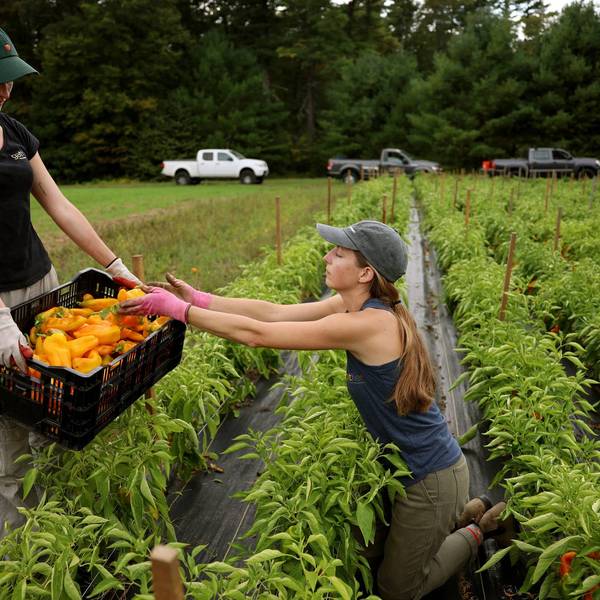Last year, the investigator working undercover at New England's largest egg farm found rows and rows of chickens packed tightly into cages so small they were unable to even extend their wings. He found dead ones--mummified and flattened like pancakes--sharing cage space with live hens who continued to lay eggs for human consumption. Some of those eggs were covered in blood.
When he found birds with uterine prolapses or facial abnormalities, he did the right thing and alerted his supervisor. "As long as it's standing up and laying eggs, that's all that matters," his supervisor coldly replied.
Public relations experts and common sense both suggest that when we're caught red-handed, we earnestly apologize and take steps to ensure it never happens again. But that's not the path most factory farm operators take. In the case of this Maine facility, they deflected by asserting the pride they take in their eggs, and blamed the laundry list of problems on their aging barns and outdated equipment.
This animal cruelty uncovered, documented by an investigator with The Humane Society of the United States, isn't rare. Over the past two decades, animal protection organizations have conducted more than 100 undercover investigations into our nation's factory farms and slaughterhouses. These investigations have repeatedly revealed sadistic abuse: workers kicking piglets, cows rammed with the blades of a forklift, and calves repeatedly shocked with metal prods. They've also exposed standardized, industry-wide practices, like confining egg-laying hens, breeding sows and veal calves in cages and crates that virtually immobilize them for their entire lives.
Rather than confront these abuses, Big Ag--which produces most of our meat, eggs and dairy--has sought to conceal them by pushing a spate of Orwellian "ag-gag" bills in state legislatures across the country. Ag-gag, a term coined by food journalism veteran Mark Bittman, is a type of anti-whistleblower legislation designed to criminalize the documentation of cruelty to animals, rather than the cruelty itself. Many ag-gag bills impose criminal penalties for photographing or videotaping inside factory farms and slaughterhouses.
The view that the American consumer should be kept in the dark is nothing new in the meat industry. For example, in his 1999 textbook Contemporary Issues in Animal Agriculture, Peter Cheeke, PhD, professor of Animal Agriculture at Oregon State University wrote, "For modern animal agriculture, the less the consumer knows about what's happening before the meat hits the plate, the better."
While the industry has won some short-term battles by passing ag-gag bills in a handful of states, they're losing the war. More than 30 ag-gag bills have been defeated in the past five years, thanks to a broad coalition of animal protection, environmental, faith, food safety and journalism organizations. A handful of ag-gag laws have passed, however, Idaho's was struck down and deemed unconstitutional by a federal judge. Lawsuits challenging Utah and North Carolina's ag-gag laws are pending in federal court.
What's been driving Big Ag's motivation to continue to push ag-gag laws, in spite of its failures, is the rise of social media. At the 2016 World Meat Congress, Ted Bilyea, an agriculture and food consultant, opined that "social media is seen as the industry's worst nightmare." He's correct. The proliferation of grisly video footage of animals confined in cages now spreads like wildfire that no amount of spin can put out.
In the 1990s, when animal protection advocates investigated factory farms, they had to copy the footage onto VHS tapes one at a time and hand them out at events and on the street, hoping the public would actually watch them. If they were lucky, footage might air on local nightly news. Now the work of investigators can be viewed by millions in a matter of days.
This increased exposure has weakened trust in animal agriculture and harmed their bottom-line. A 2010 study out of Kansas State University found that media stories about investigations decreases consumer demand for meat. A 2016 study published in the journal Food Policy concluded, "Awareness of ag-gag laws erodes trust in farmers and increases support for animal welfare regulations."
It appears the stronger Big Ag fights for secrecy, the more consumers fight for change. Massachusetts residents just passed a ballot measure that bans the production and sale of eggs, veal and pork from animals confined in cruel cages with an overwhelming 78 percent of the vote. Similar farm animal protection measures have passed on the ballot in California, Florida and Arizona.
And the food industry is responding to consumer demand. In the last five years, just about every major grocery and restaurant chain has pledged to transition to purchasing solely cage-free eggs and crate-free pork, including McDonald's and Walmart.
As state legislatures reconvene in the New Year and begin the arduous task of governing a divided citizenry, they should emphatically reject proposed legislation that seeks to silence food industry whistleblowers and suppress information from consumers.
The fresh start of the New Year grants us all the opportunity--including animal agribusiness leaders and their political allies in the state legislature--to self-reflect and take strides in a more positive direction. Will they double-down and suppress whistleblowers? Or will they come clean, and commit to authentic transparency and higher animal welfare standards? The choice is up to them.



